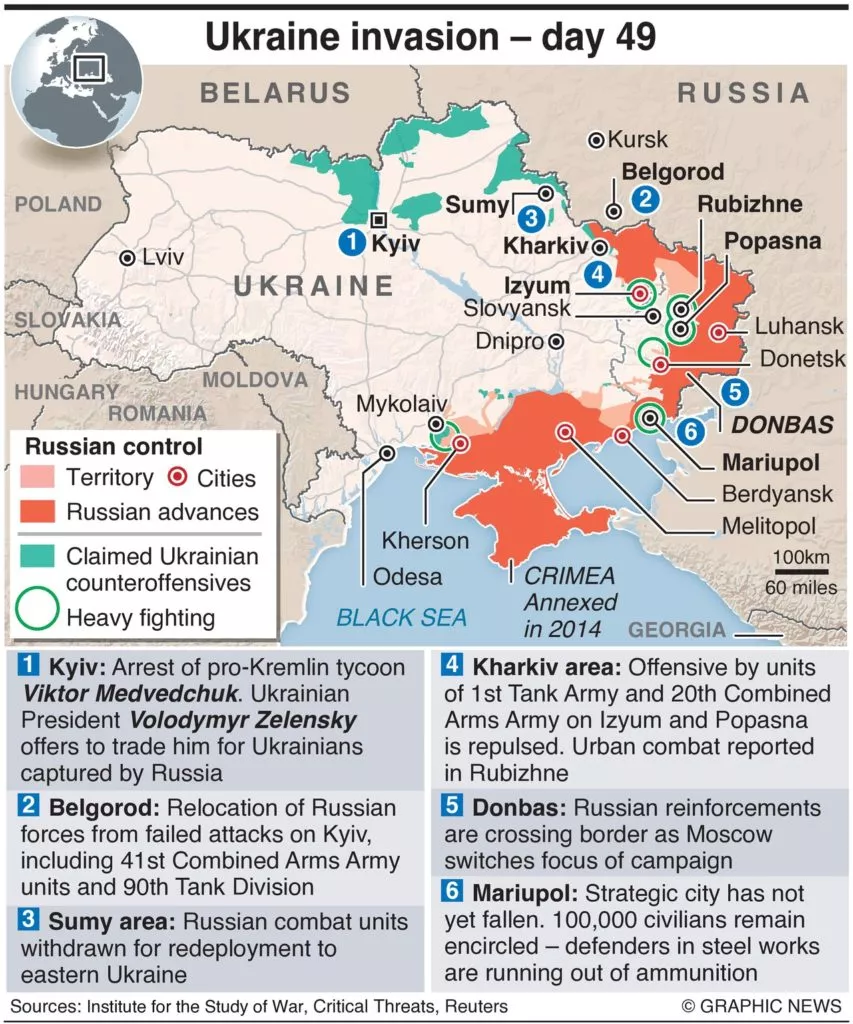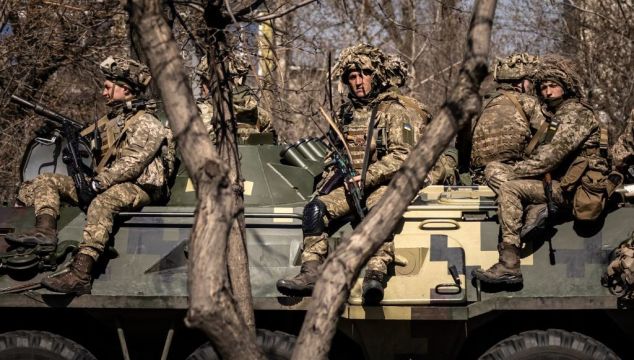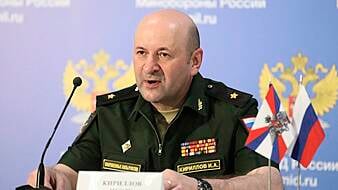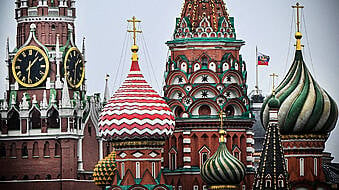Russia is beefing up its forces for a new assault on Ukraine's eastern Donbas region, setting the stage for a protracted battle that is certain to inflict heavy losses on both sides as the Russians try to encircle Ukraine's fighters, analysts said.
Military analysts are wary of predicting who will win the battle for Ukraine's industrial heartland of Donbas, a crucial conflict that will likely be brutal and ultimately define the course of the war.
"The outcome of the battle could be that both sides will be battered to the point when neither one will be able to conduct an offensive or a counter-offensive," said Konrad Muzyka, director of the Poland-based Rochan consultancy.
"Ukrainians will defend their land to the last man. The Russians will incur significant losses."
An uneasy "frozen" conflict could emerge and last for months with the constant threat of a fresh assault by Moscow, he said. Russia describes its campaign, which began in February, as a special operation to degrade Ukraine's military capabilities and root out dangerous nationalists.
Outgunned by Russia, Ukrainian President Volodymyr Zelenksiy has called on the West to help save his country. He wants NATO to help police its airspace and the West to ship more fighter aircraft, missiles and anti-tank rockets.
Donbas and Luhansk
Moscow began pulling out its forces from near Kyiv and Ukraine's north late last month in order, it said, to focus on taking the Donbas.
Even without reinforcements now arriving, Russia's invasion has slowly pushed back Ukrainian fighters in some areas of the Donbas and secured around 90 per cent of Luhansk region, said Nick Reynolds, a land warfare analyst at the RUSI think-tank in London.
Ukraine's troops have held on more robustly in Donetsk, which together with Luhansk makes up Russian-speaking Donbas, a swathe of which was seized by Russia-backed separatists in 2014. A significant Ukrainian contingent has been dug in since then.
Fearing that their forces could be encircled, Ukrainian strategists will have to evaluate constantly whether they should pull the fighters back to avoid a quick, chaotic retreat in which they could become separated or smashed by artillery and aerial fire.
"It's disengaging from ... the front line that's going to be the problem. That's one of the calls the Ukrainians are going to have to make," Reynolds said.
At the southern edge of Donetsk region on the Sea of Azov, Russia looks poised to wrest full control of the besieged port city of Mariupol where exhausted Ukrainian marines have been desperately holding out, Reynolds said.
"Unless the Russian advance runs out of steam with logistics and morale, I think Mariupol is unfortunately done...If Mariupol falls, it frees up a lot of manpower for other parts of (Russia's) advance," Reynolds said.
Russia could launch its fresh Donbas assault as early as the end of this week or next week when reinforcements have arrived from Russia and Belarus as well as Kyiv, Chernihiv and Sumy in Ukraine, Muzyka said.

U.S. private firm Maxar released satellite images taken on Friday showing an eight-mile-long Russian military convoy of armoured vehicles and trucks towing artillery and support kit east of the Ukrainian city of Kharkiv heading south towards the Donbas.
Russia's northern pincer advance would likely push south from the town of Izyum that lies strategically on the road towards the Ukrainian-held towns of Sloviansk and Kramatorsk.
The governor of Donetsk region said on Tuesday that Russia looked like it was in the final phase of regrouping and was pounding the region with shelling around the clock.
"We are going to see a prolonged battle for Donbas. Russia has chances to prevail but only because of its preponderance of firepower and equipment and manpower, and not because of operational superiority," said Muzyka.
Meanwhile, Russia's defence ministry said that 1,026 soldiers of Ukraine's 36th Marine Brigade, including 162 officers, had surrendered in the besieged port city of Mariupol. Ukraine's defence ministry spokesman said he had no information on such a surrender.
The mayor of Mariupol, Vadym Boichenko, said in televised remarks that more than 100,000 people remained in the city awaiting evacuation. He said earlier that some 21,000 civilian residents had been killed during the siege.
Kharkiv shelling
At least seven people were killed and 22 wounded by shelling in the northeastern Ukrainian region of Kharkiv over the past 24 hours, Governor Oleh Synehubov said.
Russia will view U.S. and NATO vehicles transporting weapons on Ukrainian territory as legitimate military targets, Deputy Foreign Minister Sergei Ryabkov told the TASS news agency in an interview.
Residents in Lubianka, a village northwest of Kyiv, are trying to rebuild their lives all while Ukrainian soldiers remove deadly mines from a nearby forest where Russian troops had set up camp.
U.S. President Joe Biden said for the first time that Russia's invasion amounts to genocide. The Kremlin said it categorically disagreed with Biden's description and that it was unacceptable.
The presidents of Poland, Lithuania, Latvia and Estonia arrived in Kyiv on Wednesday to meet Ukrainian President Volodymyr Zelenskiy, the Polish leader's office said.
A mission of experts set up by Organization for Security and Cooperation and Europe (OSCE) nations has found evidence of war crimes and crimes against humanity by Russia in Ukraine, an initial report by the mission said. Russia has repeatedly denied targeting civilians in the conflict.
Russia said that claims by the United States and Ukraine that its forces could use chemical weapons were disinformation because Moscow destroyed its last chemical stockpiles in 2017.







